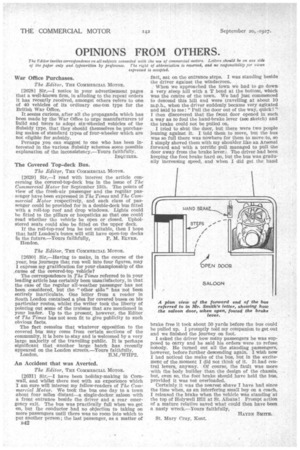OPINIONS FROM OTHERS.
Page 60

If you've noticed an error in this article please click here to report it so we can fix it.
The Editor invites correspondence on all subjects connected with the USE Of commercial motors. Letters should be on one side of the paper only and typewritten by preference. The right of abbreviation is reserved, and no responsibility joy views
expressed is accepted.
War Office Purchases.
The Editor, TIEE COMMERCIAL MOTOR.
[2628] notice in your advertisement pages that a well-known firm, in alluding to the repeat orders it has recently received, amongst others refers to one of 40 vehicles of its ordinary one-ton type for the British War Office.
It seems curious, after all the propaganda which has been made by the War Office to urge manufacturers td build and users to adopt six-wheeled vehicles of the Subsidy type, that they should themselves be purchasing makes of standard types of four-wheeler which are not eligible for subsidy.
Pernaps you oar' suggest to one who has been interested in the various Subsidy schemes some possible explanation of the inconsistency.—Yours faithfully.
INQUIRER.
The Covered Top-deck Bus.
The Editor, THE COMMERCIAL MOTOR.
[2629] Sir,—I read with interest the article concerning the covered-top-deck bus in the issue of The Commercial Motor for September 13th. The points of view of the fresh-air passenger and the regular passenger have been expressed in The Times and The Commercial Motor respectively, and each class of passenger could be provided for in a double-deck bus fitted with a roll-top roof and drop windows. Lights could he fitted to the pillars or hoopsticks so that one could read whether the vehicle be open or closed. Upholstered seats could also be fitted on the upper deck.
If the roll-top-roof bus be not suitable, then I hope that half London's buses will still have open-top decks in the future.—Yours faithfully, P. M. ELVES. Hendon.
The Editor, THE COMMERCIAL MOTOR.
[2630] Sir,—Having to make, in the course of the year, bus journeys that run well into four figures, may I express my gratification for your championship of the cause of the covered-top vehicle?
The correspondence in The Times referred to in your leading article has certainly been unsatisfactory, in that the case of the regular all-weather passenger has not been considered, but the "other side" has not been entirely inarticulate. One letter from a reader in South London contained a plea for covered buses on his particular routes, whilst the writer took the liberty of pointing out some of the truisms that are mentioned in your leader. Up to the present, however, the Editor of The Times has not seen fit to give publicity to such obvious facts.
The fact remains that whatever opposition to the covered bus may come from certain sections of the community, it is here to stay and is welcomed by a very large majority of the travelling public. It is perhaps significant that another large batch has recently appeared on the London streets.—Yours faithfully, London. B.M./WHP2,
An Accident that was Averted.
The Editor, THE COMMERCIAL MOTOR.
[2631] have been holiday-making in Corn wall, and whilst there met with an experience which I am sure will interest my fellow-readers of The Commercial Motor. We took the bus one day to a town about four miles distant—a single-decker, saloon with a front entrance beside the driver and a rear emergency exit. The bus was practically full when we got on, but the conductor had no objection to taking on more passengers until there was no room into which to put another person ; the last passenger, as a matter of fact, sat on the entrance steps. I was standing beside the driver against the windscreen. , When We approached the fown we had to go down a very steep hill with a T bend at the bottom, which was the centre of the town. We had just commenced to descend this hill and were travelling at about 10 m.p.h., when the driver suddenly became very agitated and laid to me: "Pull the door out of the way, quick! I then discovered that the front door opened in such a, way as to foul the hand-brake lever (see sketch) and the brake could not be pulled on.
. I tried to shut the door, but there were two people leaning against it. I told them to move, but the bus was so full there was nowhere for them to move.to, so I simply shoved them with my shoulder like an Arsenal forward and with a terrific pull managed to pull the door away from the brake lever. The driver had been keeping the foot brake hard on, but the bus was gradually increasing speed, and when I did get the haud
brake free it took about 50 yards before the bus could be pulled up. I promptly told my companion to get out and we finished the journey on foot.
I asked the driver how many passengers be was supposed to carry and he said his orders were to refuse nobody. He turned out all the standing passengers, however, before further descending again. I wish now I had noticed the make of the bus, but in the excitenaent of the moment I did not think of it. It had central levers, anyway. Of course, the fault was more with the body builder than the design of the chassis, but, even so, the foot brake should have held the bus, provided it was not overloaded.
Certainly it was the nearest shave I have had since the time when, as an interfering small boy on a coach, I released the brake when the vehicle was standing at the top of Holywell Hill at St. Albans! Prompt action of a mature relative saved what could then have been a nasty wreck.—Yours faithfully, HAYDN &SETH. St. Mary Cray, Kent.




































































































